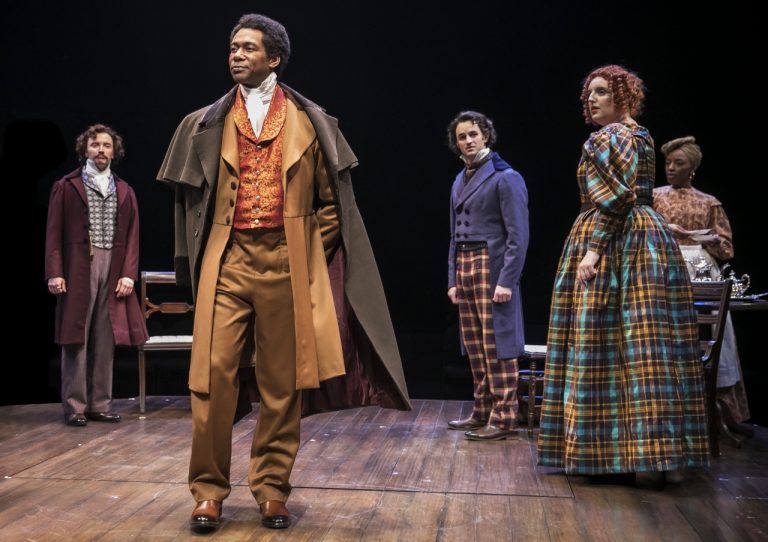Red Velvet

Chicago Shakespeare Theater
Playgoer’s Guide - The Story
Red Velvet
December 1 through January 21, 2018
CST's Courtyard Theater
by Lolita Chakrabarti
directed by Gary Griffin
https://www.chicagoshakes.com/plays_and_events/velvet/redvelvet_playgoersguide
The year is 1867. In a theater dressing room in Lodz, Poland, Ira Aldridge prepares to perform his King Lear when the intrusion of a young reporter, determined to get her story, forces the sixty-year-old actor to look back upon the defining moment of his career, more than thirty years before.
Riots erupt in London’s streets as Parliament prepares to vote in 1833 on abolishing slavery throughout the British colonies. On the stage at Covent Garden’s world-renowned Theatre Royal, Edmund Kean, the greatest classical actor of the age, plays Othello until one night he collapses onstage. Charles Kean, Edmund’s son and “presumptive heir,” anticipates stepping into his father’s role. But the theater’s manager, Pierre Laporte, proposes instead an outside actor who has played Othello to much acclaim throughout the provinces; moments later, Ira Aldridge enters the room to rehearse with his fellow cast members—sight unseen by all but Pierre. Aldridge’s Othello is riveting, but the reactions from his company members and London’s theater critics are as complex as they are divisive. And the choice made by a friend and colleague changes the course of Aldridge’s life.
THE LIFE OF IRA ALDRIDGE
When Ira Frederick Aldridge was born, the son of free parents, in New York City in1807, slavery was legal in the state of New York. His father was a straw merchant and lay preacher. At the age of thirteen, Ira began what was likely just two years of formal schooling at one of New York’s African Free Schools, founded to educate the children of slaves and the city’s free-born population. Among his jobs growing up, he ran errands for the English actor Henry Wallack. His father wanted his son to pursue a religious career, but Ira had discovered his passion for the theater.
After performing at New York’s African Grove Theatre, at seventeen he sailed to England in 1824 to seek roles unavailable to him in America. He was eighteen when he secured his first roles on London’s stages performing in traditionally black roles, and married an Englishwoman named Margaret Gill. Two years later, Aldridge began his extensive touring career throughout the British provinces.
When Edmund Kean—the most renowned tragedian of his era—in 1833 collapsed onstage as he performed Othello, the twenty-five-year-old Aldridge was asked to step into the role he had played with much success in the provinces. But this time his platform was one of London’s most prestigious theaters, the Royal Coburg in Covent Garden. Working alongside the great actors of London’s stage, including Ellen Tree as Desdemona, it was the opportunity of a lifetime. Opinions differed widely among London’s critics, but most reviews revealed their authors’ racial prejudices, citing Aldridge's physical features, lack of intellectual understanding, unusual accent and pronunciation, and his interactions with white actors, as reasons to condemn his performance as unworthy of the Convent Garden stage.
The production was cancelled following Aldridge’s first two performances. Aldridge resumed his touring across England, and later launched his first continental tour in 1852, becoming one of the most renowned and celebrated actors of the nineteenth century. Aldridge was met with critical success across Europe, becoming one of the highest-paid actors in the world at the time. After his wife died in 1864, he married Amanda von Brandt, a Swedish woman and the mother of his three children.
Aldridge became known across the Continent for other great Shakespearean roles, as well, including Shylock, Macbeth and, in later years, King Lear. As was customary at the time, he played what were held as traditionally white roles in “whiteface.” He was the first to perform Shakespeare in Serbia and in parts of Russia, where his performances were so powerful that they provoked uprisings, and led to several Shakespeare texts being banned entirely. Performing the role of Aaron, he restored one of Shakespeare's early works, Titus Andronicus, to the stage for the first time in 128 years. He was acclaimed for his performances in non-Shakespearean plays too, including A Slave’s Revenge, The Padlock, The Virginian Mummy, The Slave, and The Castle Slave. In 1867, at the age of sixty and suffering from a lung infection, Ira Aldridge died in Lodz, Poland, where he was given a state funeral. He never returned to America after leaving his birthplace more than forty years before.
Chicago Theater Review: RED VELVET (Chicago Shakespeare Theater)
by Lawrence Bommer
December 9, 2017
in Theater-Chicago
http://www.stageandcinema.com/2017/12/09/red-velvet/
BURNT BY THE TRAIL HE BLAZED
What in theater is ever off limits? And, above all, who? Besides the probability of the part, are there bounds to the roles an actor can play? Believing that merit mattered more than credentials or cachet, Napoleon promised careers open only to talent. Color-blind casting is the logical extension of this not so radical acceptance of and readiness for diversity. But the first souls to test tolerance paid a price retroactively owed by all who profit from their pain.
In Lolita Chakrabarti’s dramatic remembrance Red Velvet (the title referring to stage curtains that conceal and reveal) that flawed pioneer is Ira Aldridge. Though fairly (or unfairly) forgotten, he was theater’s Jackie Robinson. His story — a quest for artistic freedom that took him from New York to London to death at 60 in Lodz, Poland — is seen from all sides. First produced in Chicago by Raven Theatre last year, it’s now in a kinetic arena staging by Gary Griffin at Chicago Shakespeare’s Courtyard Theater.

photo by Liz Lauren
As test of the limits of make-belief (as every play always is), Red Velvet also delivers an acid-etched depiction of the loneliness of first achievers. A force field in his own right and a blessing to the Bard, Stratford Festival tyro Dion Johnstone gives his anguished Aldridge the immediacy that history demands.
The son of free parents, this African-American apprentice actor rejected his father’s choice of religious devotion to foster a passion for the stage. That hunger would send him abroad for the rest of his life (much as Josephine Baker would later abandon a Jim Crow America for Paris). His Macbeth, Shylock, and Lear were wilder, perhaps truer, than audiences had ever felt.
Chakrabarti frames her ambivalent tribute to Aldridge with scenes of the weathered thespian, famous and embittered, on death’s door: The still-restless performer is interviewed in 1867 by an ambitious and equally underesteemed journalist (Annie Purcell). Coming full circle, at the end he puts on “whiteface” to play the now-kindred part of King Lear.
Between these bookends we see why Aldridge has become a lion in winter, raging at the notoriety that consumed him.
Enacted beneath set designer Scott M. Davis’s magnificently burnished Victorian proscenium and performed in Mara Blumenfeld’s astonishingly accurate costumes, the play turns on a pivotal point. We’re present at a creation, the night in 1833 when Aldridge briefly “replaced” renowned tragedian Edmund Kean at Covent Gardens’ Royal Coburg Theater. It was a fateful advent. This was the volatile year when the abolition of slavery hung in the balance. The streets surged with protest. And now an actual “African” would play Othello in a world where “equal” and “opportunity” were doomed to separate sentences.
With damning detail Chakrabarti presents the company’s mixed reactions to this unsought debut. Pluckily determined that the show must go on, leading lady Ellen Tree (the ever charismatic Chaon Cross) is game to do Desdemona with an authentic “blackamoor.” An idealistic abolitionist, the ensemble’s “juvenile” (Jurgen Hooper) also welcomes this serendipitous precedent. Opposed are old-school ham Terence (Roderick Peeples) and, most of all, Kean’s entitled, now jealous, son Charles (Michael Hayden). Dismissing Aldridge’s arrival as a freakish travesty, they decry this pandering “minstrel-show” gimmick that inevitably diminishes the universality of the role by taking it literally (as pointless privilege dictates, the part, Charles whines, is his to refuse).
What the troupe is not prepared for is how much Aldridge’s style is as disruptive as his skin. Though instantly at home among his fellow artists, he imperiously rejects the mannered gesticulations, sensation-seeking declamations, and portentous posing of the period. In effect he invents “method acting” on the spot.
With its deliciously catty “behind the scenes” revelations, the scene erupts into a squabble between Aldridge’s natural realism, an instinctual spontaneity that appeals to Ellen’s adventurous artistry, and the British reliance on technique over inspiration.

photo by Liz Lauren
No storied triumph of excellence over bigotry, Aldridge’s Othello would perversely ignite and seemingly excuse the racism and condescension of London critics. But he bears blame too, brutally manhandling his imaginary white wife on stage as he never would his actual one (Purcell), a sweetly contented hausfrau. However supportive and sympathetic, theater manager Pierre LaPorte (Greg Matthew Anderson) is forced to terminate the engagement. Their flashpoint fight — Aldridge’s insisting on the supremacy of genius and LaPorte demanding that, no matter his origin, an actor must “pay his dues” to earn his place under the lights — is the play’s second cage-match debate on the right to own roles.
No Rosa Parks, a chronically defiant Aldridge never intended to advance an entire race, just his resume. But even good change exacts a terrible toll: In forging his fame, Aldridge paid crueler dues than LaPorte could imagine. At its best, Chakrabarti’s sometimes distracted and discursive script drives home the unavoidable isolation of an unintended forerunner. With Griffin characteristically extracting gold from every scene, Johnstone and eleven supporting pillars are at the top of their bent for 115 mostly memorable minutes.
Though no definitive portrait of this complex entertainer (we never see Aldridge’s anti-slavery agitation), Red Velvet does to Aldridge what Shakespeare did for Othello. Our response remains: “Oh the pity of it all!”

